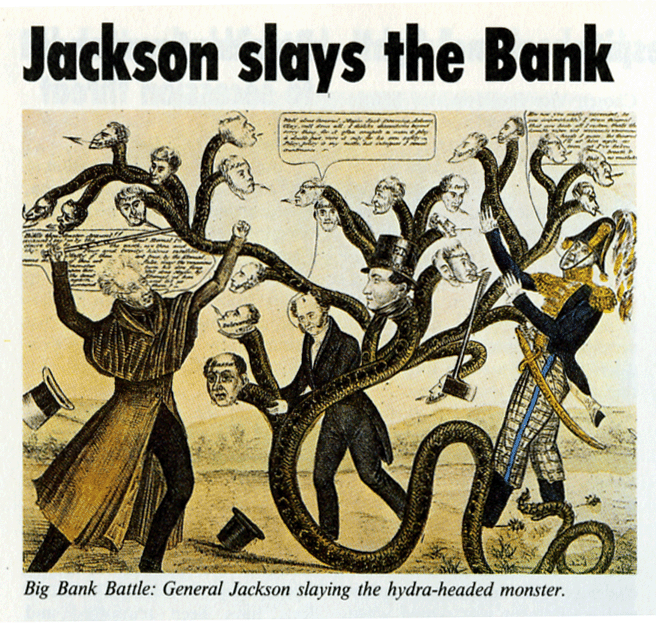
| Economics Economics represents the essence of our Fraternity. |
 Exerpts from Andrew Jacksons Farewell Address March 4, 1837 In reviewing the conflicts which have taken place between different interests in the United States and the policy pursued since the adoption of our present form of Government, we find nothing that has produced such deep-seated evil as the course of legislation in relation to the currency. The Constitution of the United States unquestionably intended to secure to the people a circulating medium of gold and silver. But the establishment of a national bank by Congress, with the privilege of issuing paper money receivable in the payment of the public dues, and the unfortunate course of legislation in the several States upon the same subject, drove from general circulation the constitutional currency and substituted one of paper in its place......... |
The Premise of a True Socialism In Maine, Service Time Swapped to Help Stretch Dollars in RecessionA PBS Newshour segment Nov 17, 2010Economists Earn Nobel Prize for Asking How Job Market Works A PBS Newshour segment Oct 11, 2010 Social Credit Upcoming Conference Targets Monetary System By Mark Anderson Social Credit - Wikipedia description Douglas Social Credit Secretariat - Offical Website Social Credit By Major Clifford Hugh Douglas The Relation Between the Economics of C. H. Douglas and Those of Rudolf Steiner By Owen Barfield The Evil Federal Reserve By Thomas D. Schauf |
| Articles
of Interest A 'time bomb' for world wheat crop The Ug99 fungus, called stem rust, could wipe out more than 80% of the world's wheat crops as it spreads from Africa, scientists fear. The race is on to breed resistant plants before it reaches the U.S. Moral Bankruptcy Why are we letting Wall Street off so easy? By Joseph E. Stiglitz Mother Jones Thank
You, Wall Street. May We Have Another?
|
But when the charter
for the Bank of the United States was obtained from Congress it
perfected the schemes of the paper system and gave to its advocates the
position they have struggled to obtain from the commencement of the
Federal Government to the present hour. The immense capital and
peculiar privileges bestowed upon it enabled it to exercise despotic
sway over the other banks in every part of the country. From its
superior strength it could seriously injure, if not destroy, the
business of any one of them which might incur its resentment; and it
openly claimed for itself the power of regulating the currency
throughout the United States. In other words, it asserted (and it
undoubtedly possessed) the power to make money plenty or scarce at its
pleasure, at any time and in any quarter of the Union, by controlling
the issues of other banks and permitting an expansion or compelling a
general contraction of the circulating medium, according to its own
will. The other banking institutions were sensible of its strength, and
they soon generally became its obedient instruments, ready at all times
to execute its mandates; and with the banks necessarily went also that
numerous class of persons in our commercial cities who depend
altogether on bank credits for their solvency and means of business,
and who are therefore obliged, for their own safety, to propitiate the
favor of the money power by distinguished zeal and devotion in its
service. The result of the ill-advised legislation which established
this great monopoly was to concentrate the whole moneyed power of the
Union, with its boundless means of corruption and its numerous
dependents, under the direction and command of one acknowledged head,
thus organizing this particular interest as one body and securing to it
unity and concert of action throughout the United States, and enabling
it to bring forward upon any occasion its entire and undivided strength
to support or defeat any measure of the Government. In the hands of
this formidable power, thus perfectly organized, was also placed
unlimited dominion over the amount of the circulating medium, giving it
the power to regulate the value of property and the fruits of labor in
every quarter of the Union, and to bestow prosperity or bring ruin upon
any city or section of the country as might best comport with its own
interest or policy. |
| The idea
of a
Three-Fold Social concept
has left this area purposefully vague. We have become acustomed to
relating to our reality from an economic perspective. To change the way
we see economy will take a little effort. But I think you'll enjoy the
results. So check back soon for progress.
News: Eventual lunch bill may spell end to dollars dominance
By Gary Duncan
10-13-04 Walmart
vs. America's Middle Class Top Fiscal Watchdog Delivers Stinging
Attack on Deficit By Ann McFeatters 1-23-04 Essays: The Evil Of Capitalism What would the world be like if it was owned by just one man? Are we really playing Monopoly?5/01 Selective
Economy Questioning the practice of
Cultural separatism. The
Rothschild Banking Network A Lecture Series World
Economy
History:
Links: Foundation of the Federal Reserve Bank Just the beginning! Bureau of the Public Debt. Sponsered by the Treasury department.
|